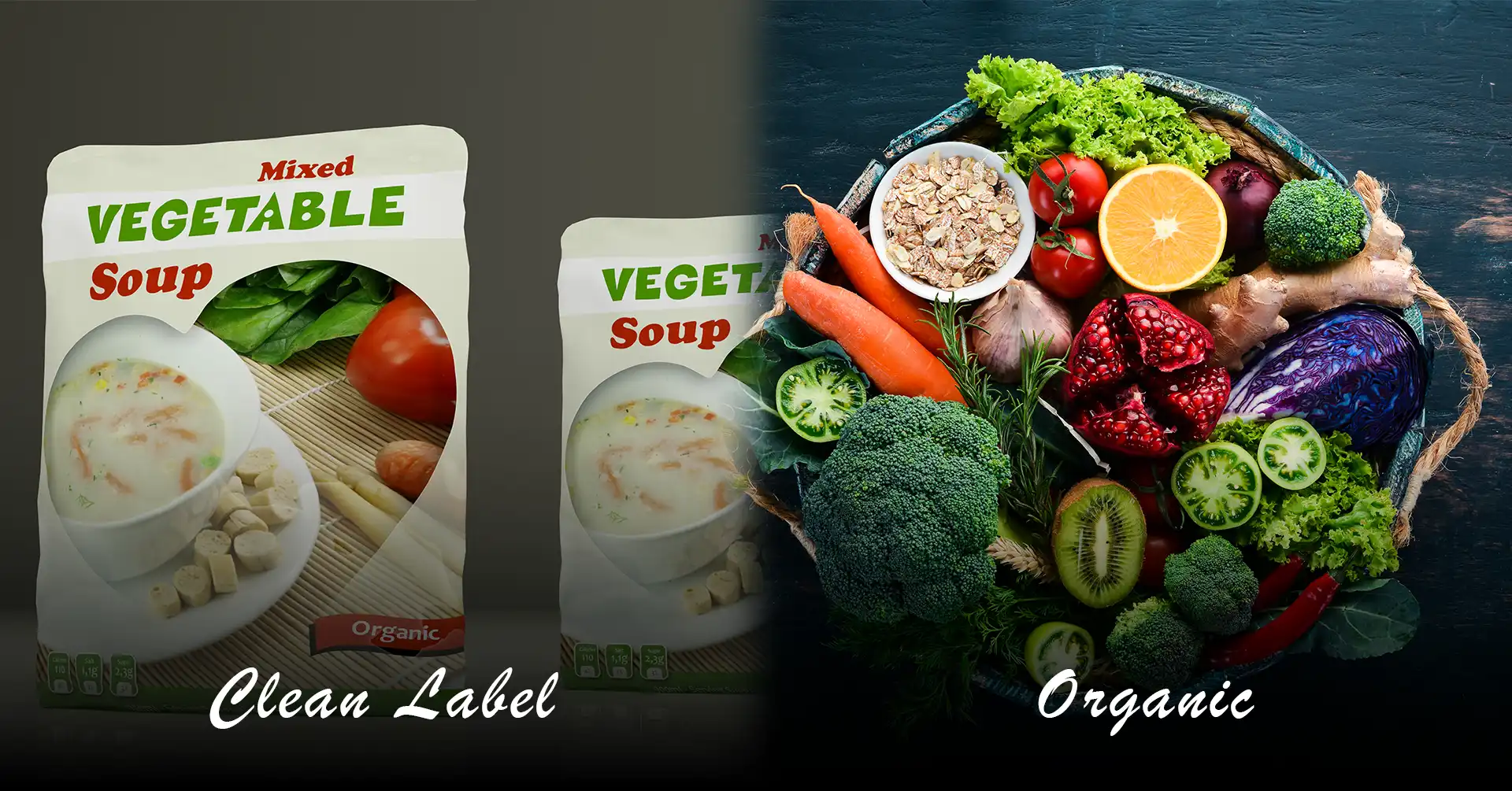heyToday, we live in a world of adulteration. So, it is important to know certain terms to save yourself from adulteration. In this article we will be briefly talking about the recent Clean Label vs. Organic terms that have come up. I am pretty sure you might have come across these terms in the food packaging. So, without any more delay, let us get started!
Clean Label vs. Organic:
Folks, before we give you a difference between these two terms. Let me give you a little backstory between these distinctions. Today, consumers are bombarded with a lot of terms, which can be really confusing. Both these terms are towards the same goal, which has a common goal of promoting healthier options with different meanings and implications. Hence, when you understand the difference between Clean Label vs. Organic terms, you will gain a good understanding, which will help you make informed choices that align with your dietary preferences and values.
What is Clean Label?
Well, when we talk about the term clean label. It has no concrete definitions. It generally refers to the products that return to basics. You can imagine it as a plate that is overflowing with whole as well as unprocessed ingredients. These can include ingredients such as fruits, vegetables, whole grains, lean proteins, and nuts. These are the ingredients that are in the closest natural state, and they are minimally altered from their farm-fresh form. When you look at the term clean label, it must be easier for you to understand as these are the products that will not contain any chemical ingredients. Today, consumers are widely attracted to simple, recognizable components. This poses a big difference when it comes to often confusing lists of artificial additives, preservatives, and highly refined ingredients found in many conventional products.
So, when we look at the terms clean label vs. organic, it is mostly about promoting healthier food. The term clean label is not only about avoiding the perceived “Bad” ingredients. However, it’s also about embracing a more natural and healthier approach to food. It also means to prioritize transparency across the food chain. Clean label manufacturers are widely looking to strive towards clean and honest labeling. One of the most essential benefits of this will be to help the consumers make proper decisions when it comes to choosing the foodstuff they will be putting on their bodies.
Now that you have gained a good understanding of the terms Clean Label vs. Organic. Head to the next section of the article as we reveal more about the organic part of food.
Organic Sustainability:
The difference between Clean Label vs. Organic is Consumers often get confused between choosing foods that have clean label options and organic food options. Organic certification are focussed on the agricultural practices that are used to grow as well as raise ingredients. When you come across products with the USDA Certified Organic label, you must know that these products strictly adhere to government regulations to ensure a more sustainable approach towards food production. When you look at organic farming closely, you will see that the practice prohibits using synthetic pesticides or herbicides, which will prove harmful to the environment.
This will lead to leaving residues on the crops. The raised livestock are not given any artificial substances to promote growth. They are not given any kind of antibiotics or any growth hormones. Primarily to promote a more natural approach towards animal husbandry. Some processing is allowed in organic products; however, the use of certain types of synthetic processing aids will be restricted to maintain the integrity of the organic products. With organic certification, you will be guaranteed that the ingredients were primarily produced with a focus on environmental sustainability and animal welfare. However, it doesn’t necessarily dictate the final product’s ingredients or processing methods.
Clean Label vs Organic- A Shared Desire for Common Goal:
Now that you all have a brief understanding of both terms let me tell you that both are meant to achieve one common goal. Both terms share some key similarities, and these philosophies advocate using whole, unprocessed ingredients as the foundation of healthy eating. Tlook towards the option of healthy eating, which reduces the need to move towards refined and processed foods.
Both these approaches look towards the options for healthy eating by eliminating harmful and artificial ingredients. These are a potential reduction in unhealthy ingredients like added sugars, sodium, and unhealthy fats. In the discussion between the Clean Label vs. Organic, both terms actively promote the importance of transparency for the consumers. When we look at the clean label, it promotes clear labeling of ingredients, while organic certification provides a guarantee of the farming practices used.
Clean Label and Organic Divergence:
Folks, we have given you a brief understanding of both these terms. Now, it’s time to look at them through a different lens. Wondering how? Keep reading to explore.
Clean label primarily offers for the final products ingredients as well as processing methods. When you look at the label products, they often overlap with the organic ingredients, which is not a requirement. Processed ingredients such as sugar or expeller-pressed oils can be used on a clean label as long as they are minimally refined and recognizable. Also, one more thing to remember is that the clean-label products might include nonorganic ingredients. However, other clean-label products choose organic ingredients for their perceived health benefits as well as the environmental impact they have. However, it is not a defining characteristic. Clean label is beyond the agricultural practices as well as encompasses the entire production process. The focus primarily lies on the final product and its ingredients, regardless of the farming methods used.
Which One to Choose?
Well, when you are looking at the debate about the clean label vs. organic, you might be confused as to which one you should choose. The answer depends on your priorities, so choose accordingly clearly. If you are looking to prioritize the ingredients and understand the clear label packaging for your food, then you might have to choose the clean label. When you are looking to prioritize food grown without synthetic pesticides and supporting sustainable agriculture, you might just want to go with organic foods. You can also embrace a combined approach, seeking out clean-label and organic products to maximize transparency, healthy ingredients, and environmentally responsible practices. However, the ultimate choice completely depends on individual values and priorities. However, both these terms offer a great avenue for promoting sustainability in food choices.
Conclusion:
In the discussion about which is better, the Clean Label vs. Organic, you might want to choose the term that suits you better and your dietary needs. However, you can also opt for a combined approach. Which will help you make more informed decisions when choosing food for yourself and your family. The key to choosing the right approach is to understand the needs and foods you regularly consume. Hence, when you are looking to choose the right option for yourself, you will get to know the right philosophy that will help you in your dietary choices. That’s all, folks. I hope the article will help you to get all the information you need.
Also Read:
Apply for a Personal Loan with These Easy-to-Follow Steps!
Dominate the Music Industry with Effective Marketing Strategies






